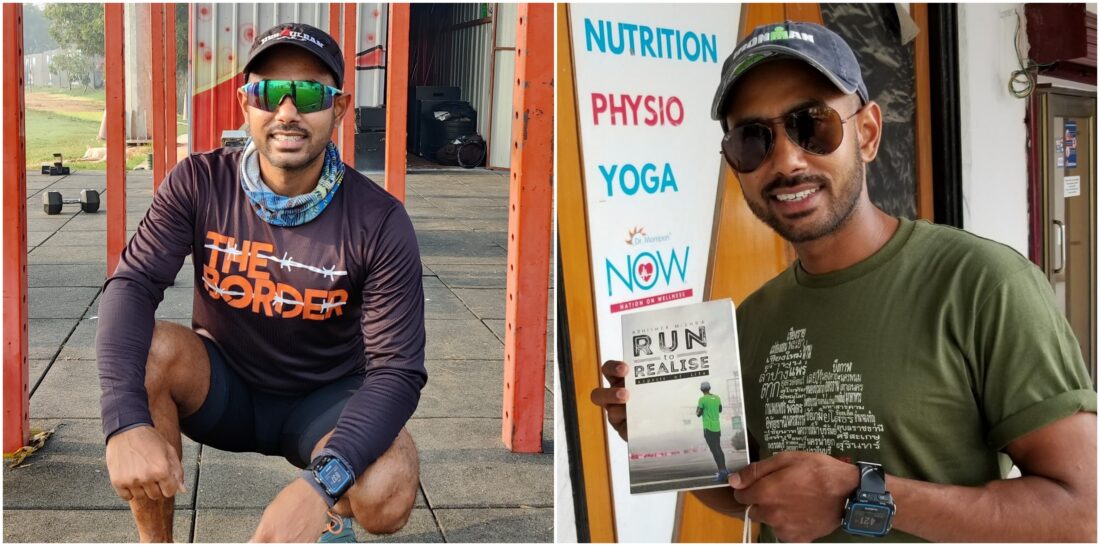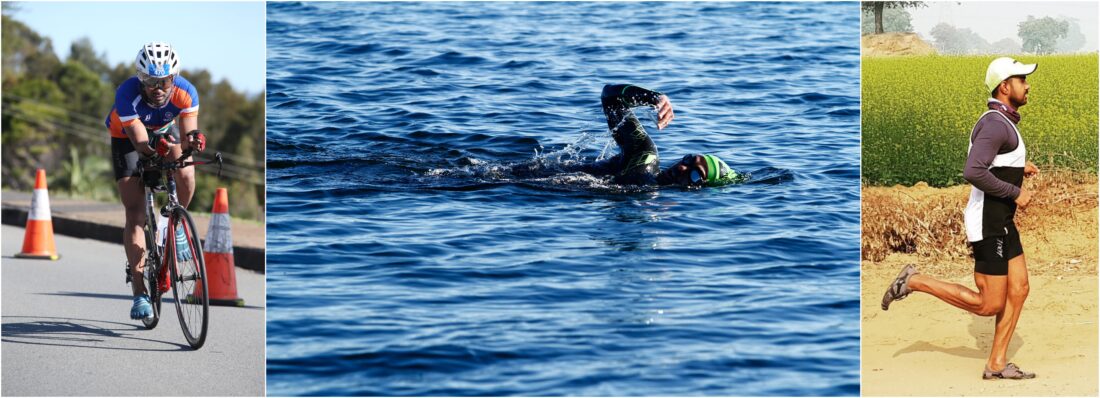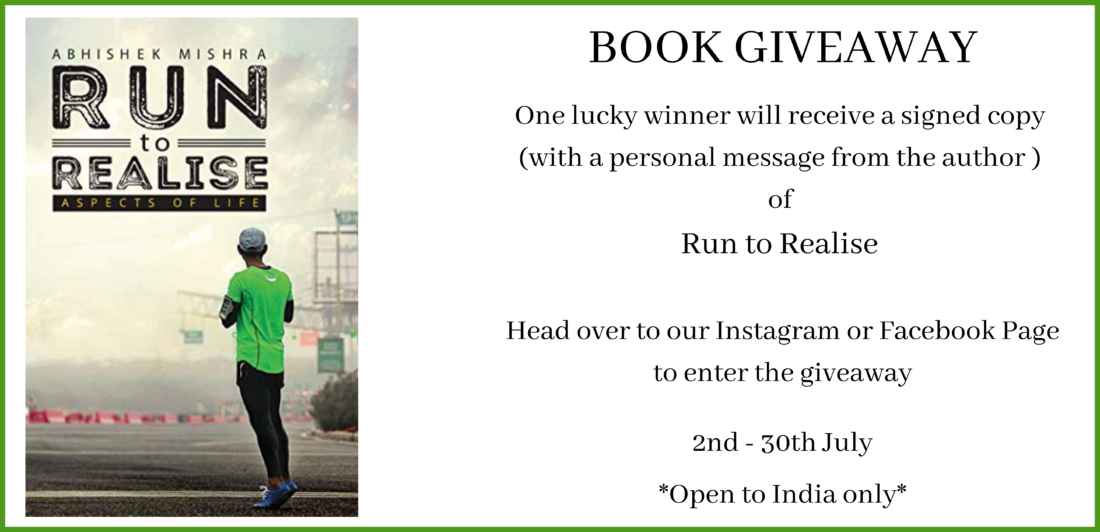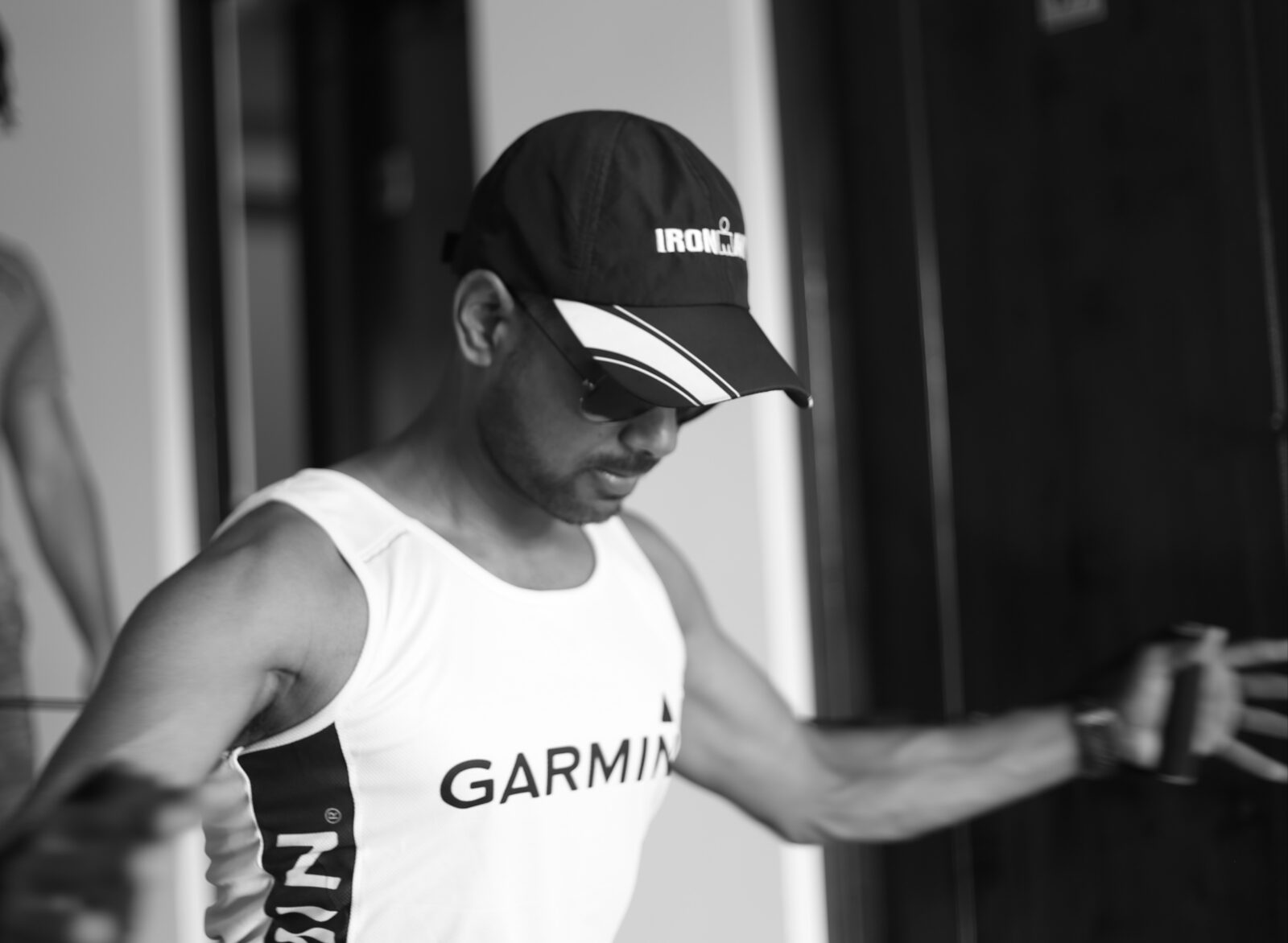By definition, a full-distance triathlon is a single race consisting of a 3.8 km swim, 180 km bike ride and a full marathon (42.2 km) that is to be completed within 17 hours. Created to settle a debate over who were the toughest athletes among swimmers, cyclists and runners at a running club’s award event in 1977 at Hawaii, the Ironman triathlon led to the making of the triathlete. And that’s where our story about Abhishek Mishra, the triathlete, begins.
A regular guy leading a regular life who decided to make his passion a reality, Abhishek’s journey from plush corporate offices after doing his engineering and management, to the blood, sweat and tears of becoming an ultra triathlete is hugely inspiring. It encourages you to believe that anything is possible when you are motivated to make your vision an actuality.
To know more about what it takes to be a triathlete, ultra runner, author and motivational speaker, we sat down for a conversation with Abhishek Mishra.
1. Let’s start at the beginning. What got you into triathlons and how long have you been competing?
The idea of doing a triathlon was triggered by an inspiring conversation with a friend in 2013 after my first ultra run. It fueled my motivation to change my attitude from being an “I Can’t” guy to an “I CAN” one. In fact, when I signed up for my first triathlon, I didn’t know how to swim. But that didn’t deter me as I began my preparations.
I was already doing Ultra Running, so I started with training myself in cycling. In April 2015, I learnt how to swim and on 26th September the same year, I participated in my first full distance triathlon at Ironman Mallorca Spain. Since then, I have done the Ultraman Triathlon, 4 Full distance Ironman, and a few half-distance races apart from various ultra runs.
2.Triathlon, Ultraman, Ironman – which has been your most memorable race in all these competitions?
The Ultraman Triathlon at Florida USA in 2017 has been the most memorable tri race of my life. We were 38 triathletes from 18 countries there by invitation. We had to finish 10 km swimming, 421 km cycling and 84 km running in 36 hours over 3 days. It was the most incredible experience and a great learning.
3. With the highs and lows in endurance sports, how do you motivate yourself when you hit physical and mental blocks?
It is very simple, I think of the single most important reason, “Why I decided to do it”. The clarity of purpose – why I started – gives me the motivation to go on. Roadblocks are a part of the journey. When you hear stories about people who have accomplished their goals while facing various challenges – it helps in clearing self doubts, which are a major reason for demotivation.
4. What are the superfoods you swear by when you are competing in a race? And what’s the first thing you eat after a race?
I believe in feeding my body holistically and naturally, whether in my daily life, during training or on race day. In the last 13 years of endurance sports – Half or Full marathons, Ultra runs, Desert runs or triathlons – I have never taken any supplements or gels, be it pre-race during the race, or post-race.
Before a race, I eat Granola with curds and cut fruits. For the cycling phase, I keep my peanut butter banana sandwich and electrolytes. And I eat very lightly in the running phase.
The post-race meal depend on which country I am in and what food is available. But yes, I remember after finishing my Ultraman Triathlon, I asked my crew if I could have an egg white cheeseburger. After 3 days of whatnot, I just wanted to sit in the bathtub and eat that!
5. Injuries are a part of endurance sports. What are the top 3 things that you do to prevent injury?
Injuries are a part of any sport. It’s important to be aware of your body and your surroundings. In triathlons and ultra running, going easy and increasing your mileage gradually is the best way to injury free training. Stay consistent and focus on the day plan. Training, recovery, rest and nutrition – all these aspects should be in balance. I think this is where an experienced mentor or a coach plays a vital role. So, to summarise – Understand your goal and plan; Stay consistent; Focus on recovery and nutrition.
6. A question that often comes to my mind is – how does an athlete train for an endurance event while working 9 to 5?
It is all about time management for anyone working 9 to 5. They need to be very effective in evaluating the unnecessary things they are doing at work or at home. To train for a full triathlon race, the training time starts with 6 to 8 hrs a week, going up to 24 to 28 hrs a week.
How does one achieve that? I make my trainees prepare a time chart for the whole week and ask them to fill it out. Trust me, it’s a game changer. When they fill out what they do from 5 am to 11 pm daily, it shocks them as they realise there are always 1 to 2 hrs available for training. So, when they send me their time chart, I mark the time when they can train without disturbing their personal, professional or social life. Like I said, it’s a game of time management.
7. What is something you constantly see people doing wrong in preparing for a competition? And if you could give them one piece of advice, what would it be?
“Too much too soon.” I see it happening constantly when motivation comes from “hearing about someone” who has taken part in these races. There is a tendency to rush into things to be a part of the tribe or because you want to do something “different”. Not only does it increase the chances of getting injuries, but it can also be the reason for quitting in the early days.
The single piece of advice for anyone getting into endurance sports is – Be clear about the purpose. Your mind-body and everything around you will start to work to your advantage as you become aware of “why” you are doing it. That’s when the variables – the weather, your job or personal life, even the pain during training will not matter.
8. What’s your training plan when you are preparing for a competition vs your routine training?
When I’m training, my monthly mileage is more than 15 to 20 km of swimming, 600 plus km of cycling, and 160 to 200 km of running. When not training, I focus more on my strength and body mobility. The volume or intensity of all three sports Swim – Cycle – Run goes down but it never stops. I do 10 to 12 km of swimming, 200 to 300 km of cycling, and 100 to 120 km of running.
9. Tell us your fitness mantra.
“Stay Aware”. I believe if you are healthy (in mind and body) you can attain any kind of fitness level you wish for. Fitness is temporary. Health is forever.

10. Your book Run To Realise has great takeaways for anyone training for endurance sports. If you could go back to the time you were starting out, which three takeaways would you tell yourself?
All of them actually. Run To Realise shares the life lessons I learnt through the various phases of becoming a triathlete. As each learning comes from the experience of a different race, so I would want all the takeaways.
11. What has being a triathlete taught you? Do you apply any lessons learnt in your day-to-day life?
The first race taught me that there are no fixed definitions for the words – Fear, Failure and Success. These are just words with which we associate stories and thoughts in our mind. Taking failure as an experience in life is the first step to getting rid of your fear. Being a triathlete has made me understand that we always have options in life – we just need to change our perspective.
12. It is admirable how approachable and grounded you are. What keeps you grounded?
The fact that I am not the only one taking on these challenges and finishing them. When you start out, you might be among the few attempting it, but when you come across others doing a better job than you, it humbles you. I will never forget the Ironman triathlon where a triathlete in his 50s who was also an amputee finished with a much better timing than a lot of us.
It’s the magic of “Endurance”. It can change your life, your belief and thought process, and keep you grounded. I always say it in my talks, “When you train for such races, you get tired and a tired mind has no Ego.”
13. What is the funniest thing that’s happened to you at an event?
I remember I ate an apple before my full marathon in 2013 in Mumbai (my first one). It resulted in me sitting in the washroom for almost 20 min after running 28 km. Clearly, an apple on run day can sometimes keep the finish line away!
15. Finally, how do you like your coffee?
In the last 2 years, I have developed a taste for black coffee. But I still like the one we beat at home and drink post-workout. And yes, I like it strong.



This is truly inspiring & motivates the will power of a woman who always wanted to be a football player but ended in the IT sector forgetting her passion. Now, it’s a lifetime awakening – if not now then never! Thanks for this incredible strong conversation with coffee – life enlightenment 💯
Thank you so much for your wonderful feedback Pomali 🙂 Wishing you all the very best in following your passion…will wait to hear about your journey 💖
Superbly articulated and relevant thoughts that are bound to be of immense value to any athlete. Sense of purpose, awareness of your body and time management are important take aways from this conversation. Also, not to forget home whipped coffee 😀
Thank you so much Anil 🙂 Agree with you… Abhishek is a huge inspiration to many…and love the bit about the coffee :))
Always wanted to try a triathlon at least once in my life. Finally this article has made me stop procrastinating and getting into action.
Excellent interview Ma’am and very inspiring.
Thank you Amol Am sure you will carpe diem! All the best 🙂
Mind over matter…grit, determination n a lot of hard work…n the best for the last…ghar ki coffee…beaten n brewed at home the way we all grew up on…..way to go.Great read Rashmi.
Love your feedback Mona…thanks so much for the support always :).P.S. see you soon :))
Great read. Articulates well Abhishek’s journey to becoming an Ultraman
Thanks so much for your lovely feedback Rama 🙂 Remember you well from the GR races…you are so inspiring 🙂
Very inspiring. Loved the interview!
Thank you so much for your feedback Chinmayee…so glad to know you enjoyed the interaction 🙂